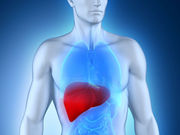For overweight patients, surgery is effective, but cost-effectiveness limited to those with F3 fibrosis
WEDNESDAY, Dec. 7, 2016 (HealthDay News) — For patients with nonalcoholic steatohepatitis (NASH), bariatric surgery is effective and cost-effective for obese patients, while for overweight patients, cost-effectiveness is limited to those with F3 fibrosis, according to a study published online Nov. 23 in Hepatology.
Matthew J. Klebanoff, from Massachusetts General Hospital in Boston, and colleagues examined the effectiveness and cost-effectiveness of surgery to manage NASH using a state-transition model. The benefits and harms of laparoscopic Roux-en-Y gastric bypass surgery were simulated for patients defined by weight class and fibrosis stage (F0 to F3).
The researchers found that in obese patients, surgery and intensive lifestyle intervention (ILI) increased quality-adjusted life-years (QALYs) by 0.678 to 2.152 and by 0.452 to 0.618, respectively, relative to no treatment. In patients with F0 to F3 fibrosis, the incremental cost-effectiveness ratios (ICERs) were $48,836, $24,949, and $19,222 per QALY for mild, moderate, or severe obesity, respectively. Surgery increased QALYs by 0.050 to 0.824 in overweight patients with F0 to F3, and ILI increased QALYs by 0.031 to 0.164. It was cost-effective to reserve treatment only for F3 patients among overweight patients, with ICERS of $30,484 and $25,367 per QALY for providing surgery or ILI, respectively, only to F3 patients.
“Our results highlight the promise of bariatric surgery for treating NASH and underscore the need for clinical trials in this area,” the authors write.
Full Text (subscription or payment may be required)
Copyright © 2016 HealthDay. All rights reserved.








